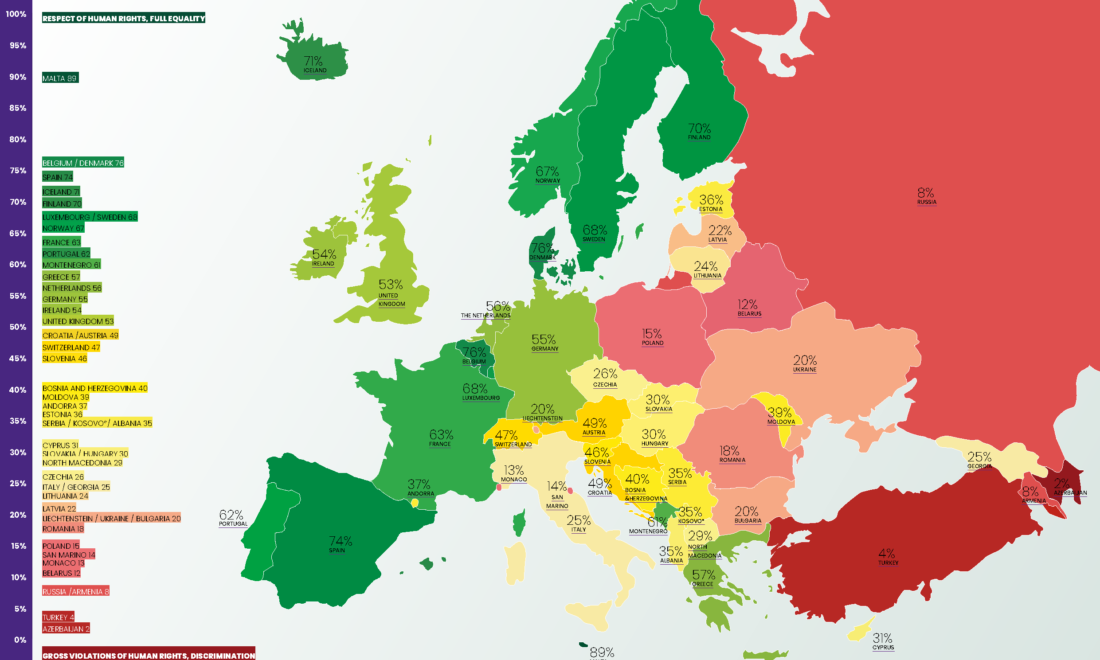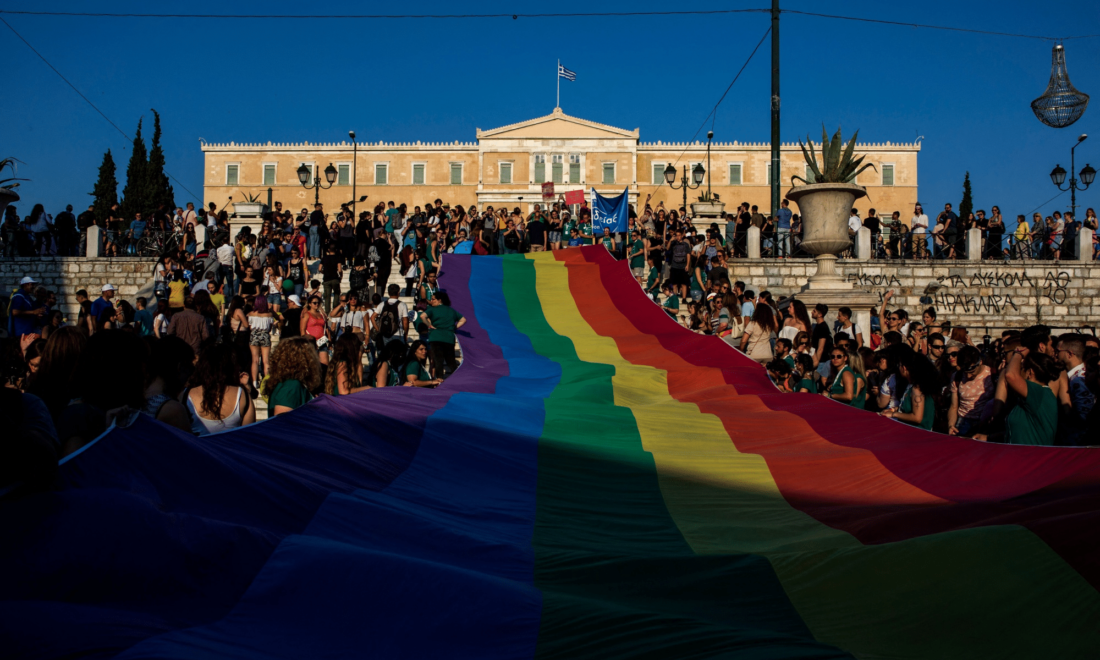The “Rainbow Europe shines brighter than hate” post will reveal which countries occupy the top spots and which are at the bottom. Furthermore, we will show the latest trends and obstacles regarding LGBT+ progress in the old continent.
Introduction of Rainbow Europe

©ILGA-Europe
ILGA-Europe’s Rainbow Map and Index has ranked European countries based on their “legal and policy situation” for LGBTQ+ people each year since 2009.
The index ranks countries from zero to 100 percent, with zero representing gross human rights violations and 100 representing full equality.
Countries ranked in seven categories: equality and non-discrimination, family, hate crime and hate speech, legal gender recognition, intersex bodily integrity, civil society space, and asylum.
The Rainbow Map and Index ranks 49 European countries on their legal and policy practices for LGBTI people, from 0 to 100%.
Note: You can also check our list of the LGBT+ friendly countries in Europe.
Latest trends in Rainbow Europe 2023
- Despite intense anti-LGBTI attacks in several countries, equality is still advancing across Europe.
- While the public discourse is becoming more polarised and violent, particularly against trans people, political determination to advance LGBTI rights is paying off. The most significant gains on the map are for countries that introduced legal gender recognition using a self-determination model. Over the past 12 months, bans on intersex genital mutilation (IGM) have also bringing countries up in the ranking.
- Rising in the ranks to fourth place was Spain (74 percent), which ILGA-Europe said was due to the country’s ground-breaking introduction of a self-ID law for trans people.
- Gender identity and sex characteristics are included in anti-discrimination and hate crime legislation, moving Belgium, Iceland, and Moldova up the chart alongside Spain.
- Moldova has jumped 14 places because sexual orientation and gender identity have been positively included in legislation covering employment, education, provision of goods and services, health, hate crime and hate speech.
- Slovenia and Switzerland switched positions. Both countries introduced same-sex marriage and joint adoption. Switzerland also allows medically assisted insemination for couples. Croatia, too, moved up one spot with its introduction of adoption for same-sex couples.
- Until 2015, the UK consistently achieved the number-one spot in the rankings, but since then has slipped down the list. It was down to 10th in 2021 before falling to 14th in 2021. This year, the country dropped further still and now sits in 17th place.
Summary
The Rainbow Map and Index presents a picture of what the policy landscape is like currently. These recommendations encourage policymakers to address critical legal and policy preferences within the Rainbow Map and Index framework. At the same time, the country-specific recommendations attempt to answer the question, “What’s next?” As a result, the recommendations are tailored to the needs of activists working on the ground. That’s why ILGA-Euorpe gathered the proposals following an online consultation with diverse LGBTI organizations in multiple countries.
- For the eighth year in a row, Malta continues to occupy the number one spot on the Rainbow Europe Map, scoring 89%.
- With 76 points, Belgium now occupies the second place with a rise of four points due to the inclusion of gender identity and sex characteristics as aggravating factors in the country’s penal code.
- Denmark comes third palace with a score of 76 with, a rise of two points due to its new equality action plan, which includes specific measures on sexual orientation and gender identity but falls short of inclusion of projects on sex characteristics.
- The three countries at the other end of the Rainbow Europe scale are Azerbaijan (2%), Turkey (4%), and Armenia (9%), the same as the last three years. Only Armenia increased an index point after revoking its ban on blood donations from men who have sex with men.
- Spain, Iceland, Finland, Moldova, Switzerland, and Croatia are the countries with the most significant jump in scores. Spain introduced a comprehensive law that regulates legal gender recognition (LGR) based on self-determination, banned genital mutilation on intersex minors, prohibited so-called “conversion” practices, and outlawed discrimination based on sexual orientation, gender identity, and sex characteristics.
- Iceland adopted an equality action plan, included gender identity and sex characteristics in their equality law, and added sex characteristics protection in the penal code. Moldova also amended its equality law and penal code to include sexual orientation and gender identity.
- Finland adopted its Trans Law, which regulates LGR based on self-determination.
- Switzerland’s legislation on marriage equality came into effect, which also gave the right to joint adoption and medically assisted insemination for same-sex couples. In Croatia, same-sex couples can apply for joint and second-parent adoption after a court decision.
Take a look at
Photo credits:
Feature photo credits: ©ILGA-Europe





